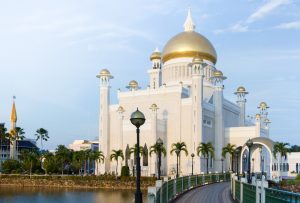Brunei has entered a two-week lockdown to contain a small outbreak of COVID-19 that has ended the country’s 457-day streak without a single case of the virus.
On Monday, Bruneian health authorities reported 42 new COVID-19 cases, the highest daily toll since the beginning of the pandemic, two days after the discovery of seven new cases marred the country’s clean sheet.
The tiny oil-rich sultanate, which is enclosed by the Malaysian state of Sarawak on the island of Borneo, has been a global COVID-19 success story, recording just over 400 cases and three deaths since the start of the pandemic. Prior to this weekend, its last positive result was reported on May 6, 2020.
Brunei has achieved this by instituting strict quarantine rules for inbound travelers. Indeed, one cluster in the current outbreak was linked to a hotel quarantine center, Health Minister Mohd Isham Jaafar told the press Monday.
“Compared to the [outbreak] last year, we don’t know the sources of many cases this time around,” Jaafar said. “We know that the weakest chain is mainly smuggling routes and frontliners from the airport to hotels.”
Brunei’s relatively small population of 450,000 and its centralized administration have helped health authorities successfully track and contain outbreaks of the disease so far. While it has not yet been confirmed that Brunei’s outbreak is a result of the more contagious Delta variant that is wreaking havoc in other parts of Southeast Asia, the health ministry has sent samples to Singapore for testing.
Announcing the COVID-19 restrictions to the press, Jaafar said that residents could not leave their home without a valid reason, while non-essential employees would be required to work from home. Public gatherings are banned, with the exception of non-coronavirus related funerals, and mosques and schools have been closed.
Brunei’s lockdown began as nearby Timor-Leste reported its first domestic transmission of the Delta variant, raising fears that it could be engulfed by the wave of cases that is tearing through neighboring Indonesia.
According to Reuters, genomic sequencing by Australia’s Doherty Institute in the first week of August found that of 27 samples taken in the country’s Ermera region from people infected with COVID-19, 12 were of the Delta variant.
Timor-Leste has recorded just 11,579 cases and 28 deaths since the start of the pandemic, but has introduced a number of lockdowns so far this year in order to prevent the spread of the disease. The health ministry reported on August 8 that the arrival of the Delta variant “is likely to cause a significant increase in case numbers, including severe cases and deaths.”
With cases on the rise, both nations are hoping they can avoid the devastating wave of Delta infections that has engulfed erstwhile Southeast Asian COVID-19 success stories like Thailand, Cambodia, Laos, and Vietnam. Serious outbreaks are also underway in Malaysia and Indonesia, while infections are once again on the rise in the Philippines.
The more infections strain of COVID-19 has feasted on the region’s densely-populated megacities and limited health infrastructure, while insufficient vaccine supplies have prevented the region from quickly reaching the widespread distribution to stem further outbreaks.
As of August 7, only 34 percent of Bruneians had received at least one shot of vaccine and less than 10 percent had received both – a surprisingly small number for such a wealthy state; in Timor-Leste, the figures are 23 percent and 7.8 percent, respectively.

































